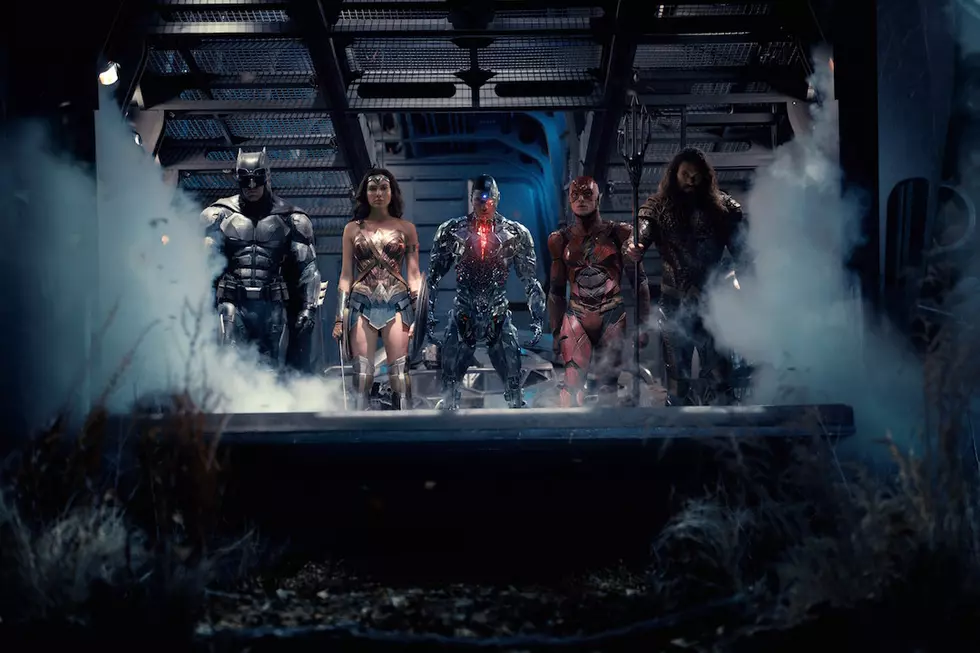
Thumbnail: The Re-Masculation of Cyborg
The recent free eight-page preview for DC's upcoming Cyborg series by David F. Walker and Ivan Reis revealed a significant change for title character Victor Stone; after having his cybernetic arms severed and his life ended by rampaging monsters, the three-quarters mechanical hero came back to life with new, more human-looking limbs. To some readers it might seem a mere cosmetic makeover, but the change may have deeper implications. To understand why, it's helpful to understand how Cyborg is regarded by black critics.
At Emerald City Comic-Con earlier this year I was lucky enough to be on a panel on diversity and representation with David F. Walker, two months after his Cyborg title was announced. During the panel Walker, a black man, mentioned something about the character that I had never considered; Cyborg is an emasculated black man. In his New 52 origin story, he lost the entire bottom half of his body, which means that before becoming Cyborg, he was castrated. This was, for Walker, a problem with the character.
That might seem an odd point to raise given that genitals aren't a prominent feature in mainstream superhero stories; artists often famously elide any suggestion of genitalia on male characters down to a Ken doll smoothness. Marvel and DC don't tell sexually explicit tales in their main lines. Genitals are not a feature of the genre. It's not something readers are invited to think about.
But if we were to think about it, we might presume that we're expected to believe that other male heroes have genitals. We know that Cyborg does not. And there are people for whom this distinction does matter, with Walker among them.
Cyborg isn't just an emasculated man, but an emasculated black man, and as one of comics' higher profile black superheroes --- starring in his own movie in distant 2020 --- the unspoken fact of his castration is demeaning. The racist narrative of black man as sexual threat is served by the idea of a character who is rendered heroic in the same event that symbolically renders him sexually unthreatening. (Genitals do not define gender or sexual power, but they are often tied to an individual's relationship with their sexual, gender, and cultural identities.)
Writer Robert Jones Jr., known online as Son of Baldwin, set out the problem of Cyborg's castration in a guest post for the blog The Middle Spaces, noting, "This, to me, is the comic book version of the historical castrations that white supremacists often enacted against black men, of whose sexuality (which they exaggerated and demonized) they were enormously envious and frightened of." Jones asks whose fantasy Cyborg is meant to represent, saying; "Sufficiently neutered, Cyborg is DC Comics’ idea of a black character safe enough to be embraced by white people." Jones also laments that Cyborg "will not suddenly grow a penis" when Walker launches his series.
But perhaps he just did?
This updated take on Cyborg, with sleek, humanized limbs that grow to replace limbs that he lost, may have been designed in part to address this very problem of Cyborg's emasculation. In this eight-page preview, Walker may have made it his first order of business to right a wrong and give the character back his lost cultural identity. Even if the restoration is never directly addressed on the page, it can safely be inferred as a likely and intended consequence of this change.
You may think this is trivial. If you don't see why this matters, you may think that it doesn't matter. You may even think it's silly that it matters so much to someone else that they would use any energy to address it. You are fortunate that the castration of one of superhero comics' most prominent black heroes does not affect you, and you're in good company with other non-black writers and editors who didn't see the problem.
If a black reader tells you that it does matter, and it is a problem, you should listen.
Audiences that don't see themselves well represented in media have excellent reason to scrutinize the detail and nuance of the few representations that do exist. What might seem a molehill in the crowded landscape of white heroes becomes a mountain on the featureless plain of black heroes.
This is why we need black writers on black characters, and minority voices on minority characters. No, not exclusively, not in either direction; white writers will continue to have their fingerprints on everything, and black writers and writers of every color, race, and ethnicity deserve the same opportunities. But if publishers want to reach a diverse audience, they need to bring in talent that can speak to those readers directly about experiences and understandings that might be shared between, say, a black character and a black audience.
Creators from marginalized and minority groups will spot problems that straight white men ignore. They will avoid pitfalls that straight white men fall into. They will see, for example, why it matters to some Asian comics fans that Psylocke, one of the most prominent Asian heroes, was born white, or why it matters to some Jewish comics fans that a half-Jewish, half-Roma character like Scarlet Witch has been stripped of half her heritage. They'll see why it matters to a black comic fan that Cyborg was castrated when he became a hero. And they'll see why it matters to take time to correct that narrative if those readers are expected to feel welcome.
More From ComicsAlliance


![A Jealous Robin Heads To Bludhaven In ‘Nightwing’ #16 [Exclusive Preview]](http://townsquare.media/site/622/files/2017/02/NTW_Featured.jpg?w=980&q=75)


![Batgirl’s Latest DC Collectibles Figure Cements Her Status as a DC Icon [Review]](http://townsquare.media/site/622/files/2017/02/IMG_1606.jpg?w=980&q=75)



